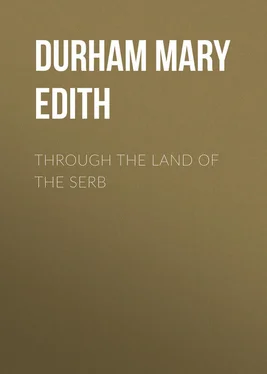Mary Durham - Through the Land of the Serb
Здесь есть возможность читать онлайн «Mary Durham - Through the Land of the Serb» — ознакомительный отрывок электронной книги совершенно бесплатно, а после прочтения отрывка купить полную версию. В некоторых случаях можно слушать аудио, скачать через торрент в формате fb2 и присутствует краткое содержание. Жанр: foreign_antique, foreign_prose, на английском языке. Описание произведения, (предисловие) а так же отзывы посетителей доступны на портале библиотеки ЛибКат.
- Название:Through the Land of the Serb
- Автор:
- Жанр:
- Год:неизвестен
- ISBN:нет данных
- Рейтинг книги:3 / 5. Голосов: 1
-
Избранное:Добавить в избранное
- Отзывы:
-
Ваша оценка:
- 60
- 1
- 2
- 3
- 4
- 5
Through the Land of the Serb: краткое содержание, описание и аннотация
Предлагаем к чтению аннотацию, описание, краткое содержание или предисловие (зависит от того, что написал сам автор книги «Through the Land of the Serb»). Если вы не нашли необходимую информацию о книге — напишите в комментариях, мы постараемся отыскать её.
Through the Land of the Serb — читать онлайн ознакомительный отрывок
Ниже представлен текст книги, разбитый по страницам. Система сохранения места последней прочитанной страницы, позволяет с удобством читать онлайн бесплатно книгу «Through the Land of the Serb», без необходимости каждый раз заново искать на чём Вы остановились. Поставьте закладку, и сможете в любой момент перейти на страницу, на которой закончили чтение.
Интервал:
Закладка:
Mary Edith Durham
Through the Land of the Serb
PART I
MONTENEGRO AND THE WAY THERE
"What land is this?"
"This is Illyria, lady."
Twelfth Night.CHAPTER I
CATTARO – NJEGUSHI – CETINJE
I do not know where the East proper begins, nor does it greatly matter, but it is somewhere on the farther side of the Adriatic, the island-studded coast which the Venetians once held. At any rate, as soon as you leave Trieste you touch the bubbling edge of the ever-simmering Eastern Question, and the unpopularity of the ruling German element is very obvious. "I – do – not – speak – German," said a young officer laboriously, "I am Bocchese"; and as we approached the Bocche he emphasised the fact that he was a Slav returning to a Slav land. Party politics run high even on the steamboat.
We awoke one morning to find the second-class saloon turned into a Herzegovinian camp, piled with gay saddle-bags and rugs upon which squatted, cross-legged, a couple of families in full native costume, and the air was thick with the highly scented tobacco which the whole party smoked incessantly. The friendly steward, a Dalmatian Italian, whispered hastily, "This is a Herzegovinian family, signorin'. Do you like the Herzegovinese?" Rather taken aback, and not knowing what his politics were, I replied, stupidly enough, "I find their costume very interesting," This frivolous remark hurt the steward deeply. "Signorin'," he said very gravely, "these are some of the bravest men in the world. Each one of these that you see would fight till he died." Then in a mysterious undertone, "They cannot live without freedom … they are leaving their own land … it has been taken, as you know, by the Austrian… They are going to Montenegro, to a free country. They have taken with them all their possessions, and they go to find freedom."
I looked at them with a curious sense of pity. Though they knew it not, they were the survivors of an old, old world, the old world which still lingers in out-of-the-way corners, and it was from the twentieth century quite as much as from the Teuton they were endeavouring to flee. All these parti-coloured saddle-bags and little bundles tied up in cotton handkerchiefs represented the worldly goods of three generations, who had left the land of their forebears and were upon a quest as mystical as any conceived by mediæval knight – they were seeking the shrine of Liberty. "Of old sat Freedom on the heights"; let us hope they found her there! I never saw them again.
On the other hand, in a boat with Austrian sympathies, the tale is very different. "I am a Viennese, Fräulein. Imagine what it is to me to have to travel in this dreary place! The people? – they are a rough, discontented set. Very ignorant. Very bad. No, I should not advise you to go to Montenegro – a most mischievous race." "And what about Bosnia and the Herzegovina?" "Oh, you will be quite safe there; we govern that. They are a bad lot, though! But we don't stand any nonsense."
Thus either party seizes upon the stranger and tries to prevent his views being "prejudiced." He seldom has need to complain that he has heard one side only; but there is a Catholic side, an Orthodox side, a Mohammedan side, there are German, Slav, Italian, Turkish, and Albanian sides; and when he has heard them all he feels far less capable of forming an opinion on the Eastern Question than he did before.
Dalmatia has its charms, but tourists swarm there, and the picturesque corners are being rapidly pulled down to provide suitable accommodation for them. Let us pass on, then, nor pause till we have wound our way through that wonderful maze of fiords, the Bocche, and landed on the quay at Cattaro. Cattaro is a tiny, greatly coveted, much-fought-for town. The natural port for Montenegro but the property of Austria, it swelters, breathless, on a strip of shore, with the waters in front of it, and the great wall of the Black Mountain rising sheer up behind. Its "heart's in the Highlands," but the enemy holds it as a garrison town; the Austrian army pervades the neighbourhood, and a big fort, lurking opposite, commands the one road from mountain to coast. Cattaro, after all, is only a half-way house to Montenegro, and this is why Austria lavishes so many troops upon it.
Behind the town starts the rough zigzag track, the celebrated "ladder of Cattaro," which until 1879 was the only path into Montenegro, and is the one the peasants still use. The making of the road was for a long while dreaded by the Montenegrins, who argued that a road that will serve for a cart will also serve for artillery. A tangible, visible gun was their idea of the means by which changes are wrought; but the road that can let in artillery can let in something more subtle, irresistible, and change-working. The road was made, and there is now no barrier to prevent the twentieth century creeping up silently and sweeping over this old-world land almost before its force is recognised. Whether the hardy mountain race which has successfully withstood the gory onslaught of the Turk for five hundred years, will come out unscathed from a bloodless encounter with Western so-called civilisation Time alone can tell.
The road from Cattaro to Cetinje has been so often written of that it is idle to describe it once again, nor can any words do it justice. After some three hours' climbing, we pass the last Austrian black-and-yellow post, and the driver, if he be a son of the mountain, points to the ground and says, "Crnagora!" (Tsernagora). Crnagora, gaunt, grey, drear, a chaos of limestone crags piled one on the other in inextricable confusion, the bare wind-swept bones of a dead world. The first view of the land comes as a shock. The horror of desolation, the endless series of bare mountain tops, the arid wilderness of bare rock majestic in its rugged loneliness, tell with one blow of the sufferings of centuries. The next instant fills one with respect and admiration for the people who have preferred liberty in this wilderness to slavery in fat lands.
Wherever possible, little patches of ground are cultivated, carefully banked up with stones to save the precious soil from being washed away, and up on the mountain sides scrubby oaks dwarfed and twisted by the wind find a foothold among the crags. Most of the men carry revolvers, and the eye soon becomes so much accustomed to weapons that on a return to unarmed lands everyone appears, for a few days, to be rather undressed. The road winds, the red roofs of Njegushi come in sight, and we make our first halt in a Montenegrin town, and rest our weary horses.
We enter the little inn, and our coachman claims his revolver, which is hanging with several others behind the bar, for none are allowed to enter Austria; they are deposited in some house near the frontier and picked up on the way back. George Stanisich, the big landlord, hurries up his womenkind to make ready a meal, looks after the drinks, and converses cheerfully on the topics of the day – preferably on the war, if there happens to be one. "Junastvo" (that is, heroism – "deeds of derring-do") is a subject that occupies a large space in the Montenegrin mind, and no wonder, and every man's ambition is to be considered a "dobar junak" (valiant warrior) and worthy of his forefathers.
Njegushi cannot fail to make a most vivid impression on the mind, for it is the entrance to a world that is new and strange. The little stone-paved room of the inn, hung with portraits of the Prince and the Tsar and Tsaritsa of Russia; the row of loaded revolvers in the bar; the blind minstrel who squats by the door and sings his long monotonous chant while he scrapes upon his one-stringed gusle; and the tall, dignified men in their picturesque garb, all belong to an unknown existence, and the world we have always known is left far below at the foot of the mountain. In Njegushi one feels that one has come a long way from England. It is, in fact, easy to travel much farther without being so far off. Yet the Montenegrin love of liberty and fair play and the Montenegrin sense of honour have made me feel more at home in this far corner of Europe than in any other foreign land.
Читать дальшеИнтервал:
Закладка:
Похожие книги на «Through the Land of the Serb»
Представляем Вашему вниманию похожие книги на «Through the Land of the Serb» списком для выбора. Мы отобрали схожую по названию и смыслу литературу в надежде предоставить читателям больше вариантов отыскать новые, интересные, ещё непрочитанные произведения.
Обсуждение, отзывы о книге «Through the Land of the Serb» и просто собственные мнения читателей. Оставьте ваши комментарии, напишите, что Вы думаете о произведении, его смысле или главных героях. Укажите что конкретно понравилось, а что нет, и почему Вы так считаете.












